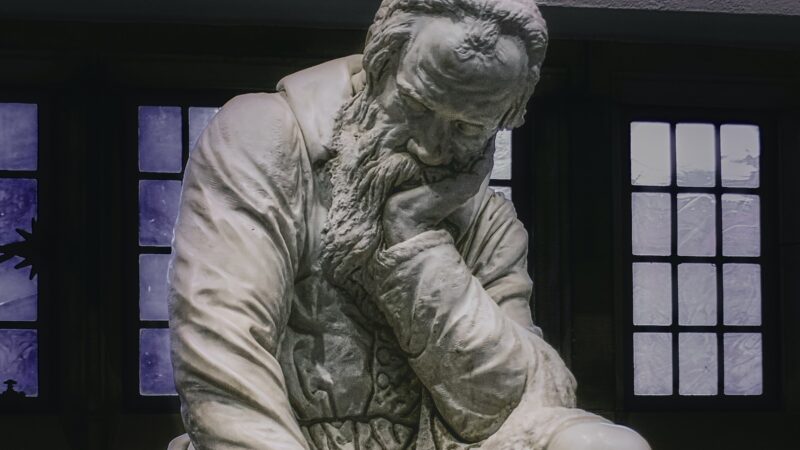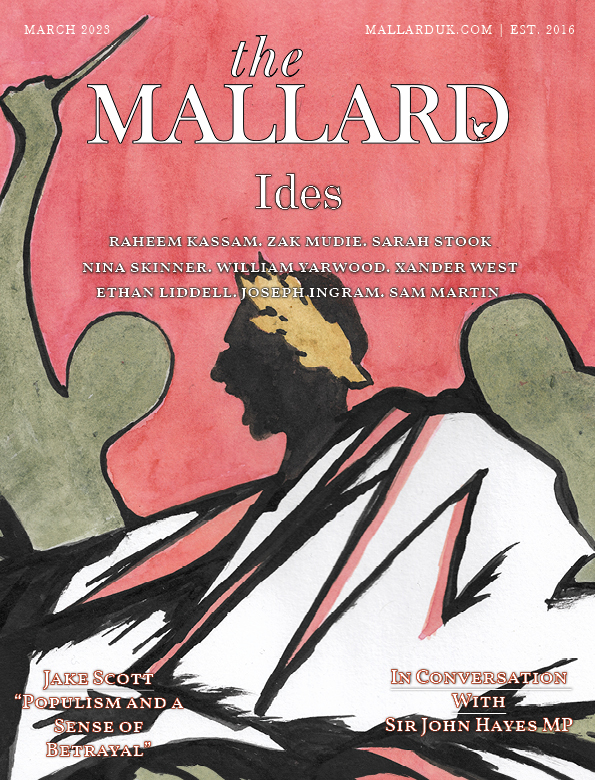Contender for the Conservative Party leadership and Prime Minister, Rishi Sunak, has declared that he would widen the scope of our PREVENT programme to include those with “anti-British” attitudes. He didn’t bother to define those attitudes but no doubt they include equality, diversity and inclusion to the extent that I will be sent to the Sensitivity Hub in the Leveled Up North for saying I don’t think young girls should cut their breasts off and that a wider cuisine base is the price worth paying for a million immigrant.
British values have had to be invented in the 21st century because they never existed. I’m sorry, but it’s true – otherwise David Cameron wouldn’t have had to try so hard to either define them or legislate for their respect. I still remember that cringe Google advert from circa 2014 that asked “what are British values” and delighted in showing us a picture of two men wearing kilts getting married. But culture, like air, is only felt in its absence. What’s worse, the definitions that have been foisted upon us of “British values” are only British in the sense that they can be found in Britain, but they are not uniquely British. Is it wrong to say that most of Europe respects the values of “equality, diversity and inclusion”?
Diversity built Britain, claims a fifty pence piece with a smug Rishi Sunak behind it. This is only true if you buy the Blairite lie that Britain was born in 1997 and actively chose to depart from its millennium-long history thereafter. Yet, these invented values are clearly not powerful enough to inspire the one thing that keeps a country together – loyalty. The chairman of this publication asked the question “what is a nation if it cannot inspire loyalty?” but neglected to interrogate the cultural dimension of that question, focusing on the legal questions of identity. This is like describing a human in terms of their body only, and making no distinction between living or dead bodies; a body needs a soul to be a person. If you don’t believe me, try and sit in the presence of the corpse of someone you know.
It does not have to be this way; and, when you climb out of the political rabbit hole built for us, you realise it actually is not this way. “Britain” is stamped across everything and pushed into your face at every opportunity – and I’ll tell you what Britishness is shortly. Instead, there is a richer dust beneath that impoverished earth that can be found, if only you look for it: Englishness.
The left fears Englishness because it is real. It does not fear Englishness because it does what the left wants to do, and better – it does not offer “an inclusive and diverse” society – but they fear it because it inspires so much loyalty and with so much ease. And as with oxygen, you only find it when you’ve been denied it for so long; but this actually makes finding it easier since we are so starved of it already. You can find it in a country pub, at a church fête, at a garden party, at a Christmas church service, in the architecture of Buckingham palace, in the music of Herder and Elgar, in the tailors of Saville Row – in short, in all the places you would not find anywhere else in the world. You don’t find it in a cup of tea, or in a queue, or the other twee nonsense that is so important to the 21st century project of multiculturalism.
You have to find these things, though. They are hidden, and consciously so – otherwise they threaten the damp, empty and meaningless focus of loyalty you’re supposed to feel, “British”. And Englishness threatens Britishness because it’s so much more powerful. I don’t blame the SNP or Plaid Cymru or Sinn Fein for being so successful. I blame our gutless, cowardly elites.
It wasn’t always like this. Britain and “Britishness” was only ever a legal identity supported by an English hegemony. There’s a reason that, for so long, writers would use the words interchangeably – it’s because they were. Englishness was unique and different to Scottishness (Welshness doesn’t exist), and quite clearly the animating spirit, the soul of Britishness. Scottish and Irish people might complain today that their culture was “erased” by the British state under an English hegemony, but to the victor, the spoils. England and Scotland had the same population sizes for centuries, and went to war so very often, it’s hardly surprising that one of them would eventually triumph.
English people were aware of this. It’s no surprise that Enoch Powell spoke about this – typically eloquently and with deeper understanding than any living politician – and urged that “Britain” concede its diminished place in the world, surrendering the Empire (and its step-child, the Commonwealth), instead accepting that England is the only real entity worth loyalty. Powell thought that clinging on to a vaguely defined “Britain” at a time when her seapower was basically gone, the massive waves of immigration were becoming the norm, and the European Economic Community was expanding, meant the hegemonic English identity would be turned in on itself, swallowed up, and hollowed out by the desire to make “Britain” as palatable as possible. As with everything else, on this issue Time has proved to be Enoch’s greatest ally, to the extent that David Lammy – who has no cultural or ethnic connection to Englishness – can call himself English. The only reason he can, is because Englishness and Britishness are still mistaken for one another. We have made the mistake of letting an English hegemony be captured by those who hate England.
But this hegemony is almost dead: whilst the last bits of “Englishness” that have dominated “Britishness” are swallowed up, it became the project of the Left in the post-Thatcher years to become even more aggressive in simultaneously undoing that hegemony whilst also turning it in on itself. That first part, of undoing this hegemony, was fuelled by Leftist desires for “equality” between Scotland and Wales, and England, and the farcical idea of Britain as a “nation of nations”, culminating in the devolution programmes that created the fake nation of Wales (still a principality of England, really) and threw the rabid dog of Scotland a steak as if that would satisfy its hunger. You don’t feed the strays.
Peter Hitchens’ Abolition of Britain catalogues that second arm of the Leftists strategy, of taking the ‘kind and gentle’ civilisation of Britain and weaponising it against the England upon which it was built. Another article published by the Mallard, written by Eino Rantanen, put this point well – “British friendliness has created not only complacency, but rather powerlessness in the face of people and ideologies that have no qualms asserting themselves, often violently”.
One violent ideology of this kind is the hated enemy of Blairism. Blairism was the final legal victory of the Leftist assault on English hegemony: again, the Blairite elements of the British state have been rightly identified before, but I will list them for the sake of explaining my point: the Supreme Court (which is a nonsense name, the Monarch in Parliament is still supreme); devolution, as I say above; the eradication of our educational heritage by devaluing university; and so on.
But, this publication has made it its job to be more optimistic, or so I’m told. The situation may look bleak, and I doubt I’ve helped, and this next point might make me sound even more blackpilled: the British project is nearly exhausted. The values that had to be invented in the sundering of the English hegemony of Britain were a sort of proto-globalism – that triumvirate of mediocrity, “equality, diversity and inclusion” have proven to be as empty as the French Revolution’s “liberte, egalite et fraternite” – but some kind of pseudo-cultural identity was needed to keep Britain going. In a way, the Left has dug its own grave, because it took away the only real substance that gave Britain an identity, and replaced it with a set of contradictory inventions.
And you can see this new public culture everywhere. Indeed, it is stamped across everything, in such a way that you cannot avoid it: for example, despite the fact that June has (somehow, unquestioningly) become “pride month”, there are still “pride parades” everywhere and all the time, and in such public spaces that you need to actively try to avoid them – an inconvenience that they are counting on, of course. And “pride parades” are not even about being gay anymore, or LGBT, or whatever, they’re just an excuse to get drunk and be promiscuous in the street, and you can take part – provided you wear the dress and make up and face paint necessary to mark you out as “one of us”, whoever the “us” is.
Contrast this, quite literally, with the fact that Eid is celebrated by thousands of Muslims on the streets of London, a religion that is less tolerant of homosexuality than Christianity. And again, you don’t even really need to be Muslim to take part in the celebration of Eid. The fact that these contrasting belief systems are publicly supported and worshipped is the sign of the absence of a communal identity, not its existence; deep and contradictory belief systems cannot be present in the same collective identity. It is just proof that different collectives live in the same space now; and the simultaneous celebration and sublimation of each is the only way their contradiction can be held in check. In the same way that Patrick Deneen wrote in Why Liberalism Failed that the expansion of atomistic individualism required a stronger state, so too does multiculturalism (another invented British “value”).
Then there’s the fact that every advert – every advert – is full of black people (or, if you want to see intersectional London’s one-step-further form of this, spot the Tube advert with an interracial lesbian couple in which both are wearing face masks). To such an extent that British people think the British population is 20% black (it’s 3%, by the way); and never mind the fact that black people are not Britian’s biggest ethnic minority, we now have a “Black history month”, apparently. You would be forgiven for thinking we lived in America – but maybe that’s the point.
Where is the room for Englishness in all of this? That’s just the point: there isn’t any, and by design. The desire to strip the England out of Britain by the Left meant that Englishness has to be sublimated in order to for “Britishness” to be viable. But here is the optimistic point of this article: the twin facts that the British project is fraying, and that English culture has to be suppressed, points to a single, irresistible conclusion. Englishness is both too powerful for the new British “identity” to counter, and that it is ripe for rediscovery.
The final point here is that, the word “rediscovery” is intentional – Englishness has to be found, partly because it is so smothered by that new British pseudo-culture I lay out above, but also because real culture is physical and tangible. You can find English culture hiding in an Anglican church, in a garden party, in the squat village pubs – basically, in all the places that are unique to England and around which a recognisable pattern of behaviour has been built. Englishness can be found once again – you just need to look for it.




